Ericsson saw very strong continued momentum in North America in Q1, where sales were up 9% y-o-y, driven by continued very high demand for 5G solutions
Ericsson is currently investing in diversifying its supplier base due to the current geopolitical environment, the vendor’s CEO Börje Ekholm, said during a conference call with investors.
“That’s an environment that we foresee to continue for quite some time. This diversification drives, of course, some short-term costs, but it also establishes greater resiliency in the company as it improves our ability to deliver to our customers,” the executive added.
Ericsson said it had decided to create a buffer of vital components in order to secure that the firm can meet customer delivery commitments.
During the conference call, Ekholm also provided an update about the company’s recent decision to halt its business in Russia due to the invasion of Ukraine.
“After the invasion in February, we realized that our business in Russia could not be sustained, and we suspended all deliveries to Russia already at that point in time. We recently decided to suspend our effective business in Russia indefinitely. This is a complex matter as telecommunication networks are part of the critical infrastructure. And as you know, many Western governments have pointed out the importance of maintaining Internet access and the flow of information for the people of Russia,” Ekholm said.
“So we will monitor the situation closely. We will continue to engage with the authorities, as we suspend our business in Russia indefinitely in an orderly fashion,” he added.
For full Q1 2022, Ericsson recorded revenues of SEK 55.1 billon ($5.75 billion), up 11% year-on-year, while net profits amounted to SEK 2.9 billion, down 8% compared to the year-ago quarter.
“We saw very strong continued momentum in North America, where sales were up 9% year-over-year, driven by continued very high demand for 5G solutions across all segments. And the U.S. customers continue to be at the forefront of 5G deployment,” the executive said.
Sales in Northeast Asia declined by 20% year-over-year, primarily as a result of project timing in Japan. However, we continue to see good opportunities in Japan which is a highly developed market with dense networks and high demand on capacity. I would here like to point out that the increased sales in Mainland China, and this is driven by timing of orders there,” Ekholm added.
The executive also noted that sales in Middle East and Africa decreased by 9% chiefly due to lower investments in 5G in the Middle East, while sales in Europe and Latin America increased by 15% year-on-year.
In a release, Ericsson said it would likely be fined by the U.S. authorities for its handling of a bribery investigation in Iraq. The Swedish vendor said in February that an internal investigation had found it may have made payments to the Islamic State militant group in Iraq at least back in 2011.
“The resolution of these matters could result in a range of actions by U.S. Department of Justice (DOJ), and may likely include additional monetary payments, the magnitude of which cannot at this time be reliably estimated. As this process is ongoing, we remain limited in what we can say about the historical events covered in the Iraq investigation and our ongoing engagement on the matter. We are fully committed to co-operating with the DOJ and our work to further strengthen our Ethics and Compliance program, controls and our culture remains a top priority,” Ekholm said.

